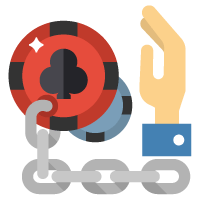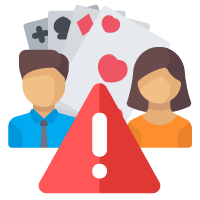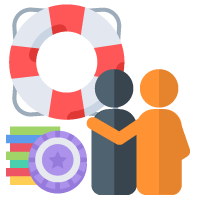Problem Gambling: Signs, Prevention & Help

Online gambling is something that is enjoyed by huge numbers of people throughout the UK, who log on and gamble in moderation. However, for some, gambling has the potential to turn into an addiction which could affect not only their own life, but the lives of their friends and family members too.
As with all addictions, the first step to getting help is first admitting that you have a problem. This can also often be the toughest step, as it takes a large amount of self-reflection. On this page, you'll find a number of the different signs to look out for if you think your gambling is becoming a problem. If you identify with any of the points, you'll then find details about the different organisations out there that can help you. Don’t let your gambling become a problem. Get help today.
Problem Gambling is Everyone’s Problem
Also called compulsive gambling, gambling addiction, or ludomania, problem gambling affects a growing number of people every year and can affect anyone regardless of age, gender or nationality. Whether it is a mild addiction that occupies only one’s free time, to gamblers whose problem affects their ability to work, it is important to recognise the signs of problem gambling before they have major impact on your and the loved ones around you.
If untreated, problem gambling often results in a number of other related psychological issues such as extreme anxiety, depression, and other such side effects which could result in loss of relationships, loss of employment, poor judgement when it comes to dealing with the effects of the compulsion and more. If you feel that you or someone you care about may have a problem with gambling, it is important to get help as soon as possible, before it starts impacting your life.
How to Identify a Gambling Problem
Problems with gambling can manifest themselves in many different forms, each of which can be equally as problematic. The key to effectively combating gambling addiction is catching it as soon as possible. The longer you wait to get help, the more difficult the treatment will be. So, even if you only find that you identify with one of the points below, it could be worth seeking professional help as soon as possible.
Below, you'll find a number of different signs associated with problem gambling.
Constantly thinking about gambling
Being preoccupied with thoughts of gambling regardless of where you are.
Chasing losses
Not being able to accept losses as part of the experience, which manifests in chasing losses.
Borrowing or stealing money
Borrowing money or even stealing money in order to gamble more or to repay debts associated with gambling.
Chasing thrills with high-stakes bets
Your gambling habits should never affect your ability to pay for your day-to-day living expenses.
Failing to pay your bills
As already mentioned, you should only gamble with money you're prepared to lose. Therefore, you should sort all your bills and other financial obligations, before you gamble. If you're using money needed to pay bills for gambling, you must get help straightaway.
Relationship woes
Spending time with family and friends is important and should never be neglected in favour of spending money at a casino.
Feelings of guilt, depression and anxiety
Problem gamblers are more likely to be affected by psychological issues and are prone to thoughts of helplessness and despair.
Feelings of withdrawal when you are not gambling
Like any addiction, problem gamblers tend to exhibit signs of withdrawal such as irritability and anxiety when they are not gambling.
Being unable to stop gambling even when you want to
The most telling sign, if you have recognised that gambling is becoming a problem, but have failed to stop, you almost certainly have an addiction.
There is no shame in recognizing that you have a problem with gambling. As with many other people, you simply need some help from professionals.
Of course, the above list is not an exhaustive one, and you could display different signs of a gambling addiction. The main rule to remember is this: if you have any thoughts that you might have a gambling addiction, you should speak to a professional, namely your doctor, a mental health professional, or a gambling addiction charity. You can find out more about getting help for gambling problems further down this page.
Those Most at Risk from Problem Gambling

Problem gambling can strike anyone, however there are some people who are more at risk than others. This can be due to many reasons, and we've listed them below. Remember this though: don't think that you can't become addicted to gambling because you don't fit with one of the profiles below – anyone can become addicted, therefore all gamblers must always remain vigilant.
Here are the cross-sections of society who are more predisposed to gambling problems:
- Men. Men have a higher chance of becoming addicted to gambling than women, although the split is closing. This is because more women are starting to gamble online. Men generally take longer to become addicted to gambling online, however they also start gambling earlier in life.
- Younger people. The younger a person is, the more likely they are to develop a gambling addiction. Those who start gambling during their teenage years are at the most risk of developing an addiction. Those starting to gamble later in life can still develop problems though.
- Mental health sufferers. Mental health problems can make it more likely for a person to develop an addiction. Problems such as ADHD, anxiety or depression all have their own unique ways of contributing to addiction. Problem gambling can also cause these problems to worsen, making gambling addiction even more difficult.
Prevention
While there is no sure-fire way to prevent the development of a gambling problem, there are certain precautions one can take when gambling in order to minimise the risks of developing bad gambling habits.
- Manage your gambling time so that it doesn’t interfere with other activities, such as family time
- Draw up a budget and stick to it - prevent being able to spend more than you can afford by carefully managing your bankroll
- Understand that gambling is for recreation and not a reliable source of income
- Do not gamble if you are feeling anxious or depressed
- If you feel like you may be developing a gambling problem talk to someone you trust
How to Get Help
Coming to the realisation that you have a gambling problem can be extremely distressing, however, there is help out there. Many fantastic organizations are around to support those in the UK with a gambling addiction, and many of them are completely free.
Resources include:
- Gamblers Anonymous - A support group who stage meetings throughout the country. Those attending GA meetings will be able to speak to others with the same problems, and understand how to stop themselves getting the urge to gamble. It is free to attend GA meetings, and most people attend at least one meeting per week.
- Gamcare - A leading national provider of information, advice, support, and free counselling, GamCare is the UK’s national organisation for gambling problems
- GambleAware - Dedicated to promoting healthy and responsible gambling practices, GambleAware supplies players with key information on recognising problem gambling and where to find help and support.
- Your family doctor - While not being able to help you directly, speaking to someone you trust with your wellbeing will allow you to access further treatment in dealing with your gambling problem.
Helping Someone with a Gambling Addiction

The first and most important thing to remember is this: if a friend or family member has a gambling addiction, you must still put your own health and wellbeing first. If you're not healthy, you won't be able to help them, and you also won't be able to fulfil your other roles, either at home or at work. It might be a good idea to phone one of the gambling charities and speak to them about support, so you can fully understand how to stay healthy while also dealing with someone's gambling problems.
The next thing is this: don't blame the person with the addiction if they relapse. It is important to remember that they have a medical problem, and that a relapse is likely to happen at some point. Instead of getting angry, encourage them and help them to get back on track. Don't blame yourself either – you can help them, but you can't force them to stop gambling.
Finally, don't try to tackle the problem alone. After all, a problem shared is a problem halved! Work alongside professionals, friends and family members to share the task. This won't only help to reduce your anxiety and stress, but having multiple people to talk to will almost certainly help the person with the gambling addiction as well.